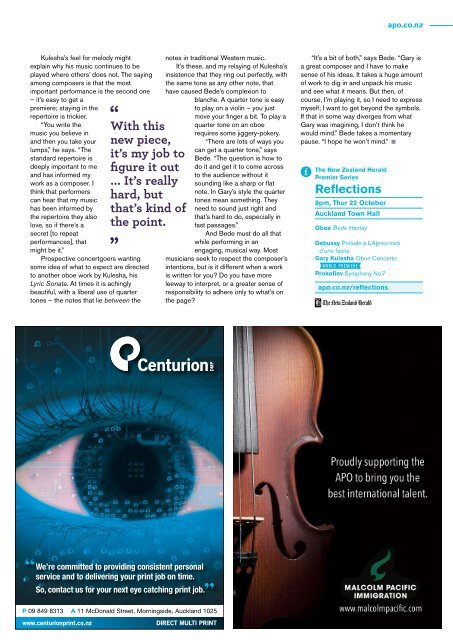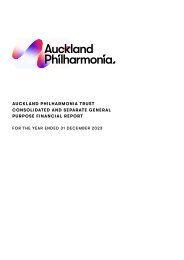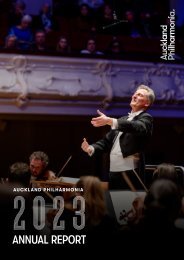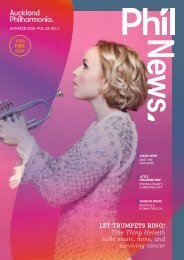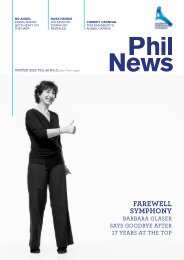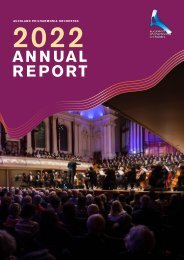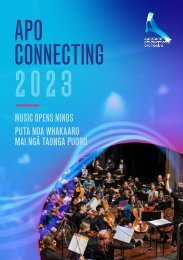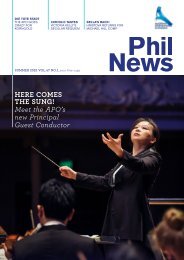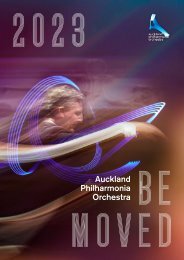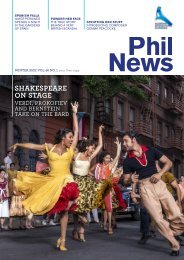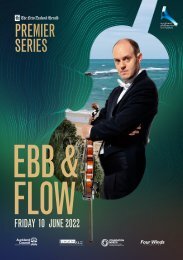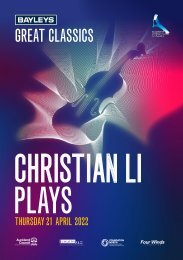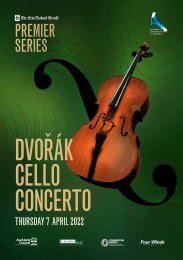Create successful ePaper yourself
Turn your PDF publications into a flip-book with our unique Google optimized e-Paper software.
apo.co.nz<br />
Kulesha’s feel for melody might<br />
explain why his music continues to be<br />
played where others’ does not. The saying<br />
among composers is that the most<br />
important performance is the second one<br />
– it’s easy to get a<br />
premiere; staying in the<br />
repertoire is trickier.<br />
With this<br />
new piece,<br />
it’s my job to<br />
figure it out<br />
.… It’s really<br />
hard, but<br />
that’s kind of<br />
the point.<br />
“You write the<br />
music you believe in<br />
and then you take your<br />
lumps,” he says. “The<br />
standard repertoire is<br />
deeply important to me<br />
and has informed my<br />
work as a composer. I<br />
think that performers<br />
can hear that my music<br />
has been informed by<br />
the repertoire they also<br />
love, so if there’s a<br />
secret [to repeat<br />
performances], that<br />
might be it.”<br />
Prospective concertgoers wanting<br />
some idea of what to expect are directed<br />
to another oboe work by Kulesha, his<br />
Lyric Sonata. At times it is achingly<br />
beautiful, with a liberal use of quarter<br />
tones – the notes that lie between the<br />
notes in traditional Western music.<br />
It’s these, and my relaying of Kulesha’s<br />
insistence that they ring out perfectly, with<br />
the same tone as any other note, that<br />
have caused Bede’s complexion to<br />
blanche. A quarter tone is easy<br />
to play on a violin – you just<br />
move your finger a bit. To play a<br />
quarter tone on an oboe<br />
requires some jiggery-pokery.<br />
“There are lots of ways you<br />
can get a quarter tone,” says<br />
Bede. “The question is how to<br />
do it and get it to come across<br />
to the audience without it<br />
sounding like a sharp or flat<br />
note. In Gary’s style the quarter<br />
tones mean something. They<br />
need to sound just right and<br />
that’s hard to do, especially in<br />
fast passages.”<br />
And Bede must do all that<br />
while performing in an<br />
engaging, musical way. Most<br />
musicians seek to respect the composer’s<br />
intentions, but is it different when a work<br />
is written for you? Do you have more<br />
leeway to interpret, or a greater sense of<br />
responsibility to adhere only to what’s on<br />
the page?<br />
“It’s a bit of both,” says Bede. “Gary is<br />
a great composer and I have to make<br />
sense of his ideas. It takes a huge amount<br />
of work to dig in and unpack his music<br />
and see what it means. But then, of<br />
course, I’m playing it, so I need to express<br />
myself; I want to get beyond the symbols.<br />
If that in some way diverges from what<br />
Gary was imagining, I don’t think he<br />
would mind.” Bede takes a momentary<br />
pause. “I hope he won’t mind.”<br />
The New Zealand Herald<br />
Premier Series<br />
Reflections<br />
8pm, Thur 22 October<br />
Auckland Town Hall<br />
Oboe Bede Hanley<br />
Debussy Prélude à L’Après-midi<br />
d’une faune<br />
Gary Kulesha Oboe Concerto<br />
WORLD PREMIERE<br />
Prokofiev Symphony No.7<br />
apo.co.nz/reflections<br />
We’re committed to providing consistent personal<br />
service and to delivering your print job on time.<br />
So, contact us for your next eye catching print job.<br />
P 09 849 8313 A 11 McDonald Street, Morningside, Auckland 1025<br />
www.centurionprint.co.nz<br />
DIRECT MULTI PRINT


